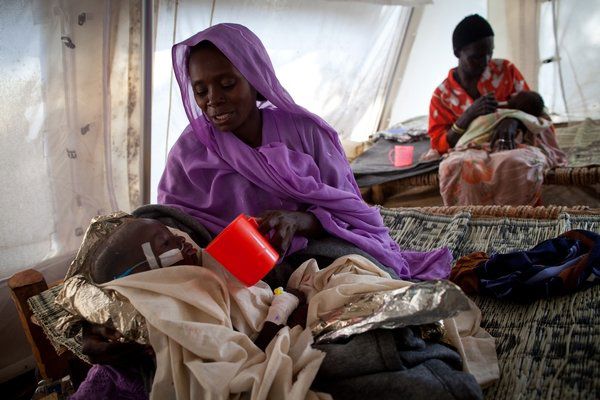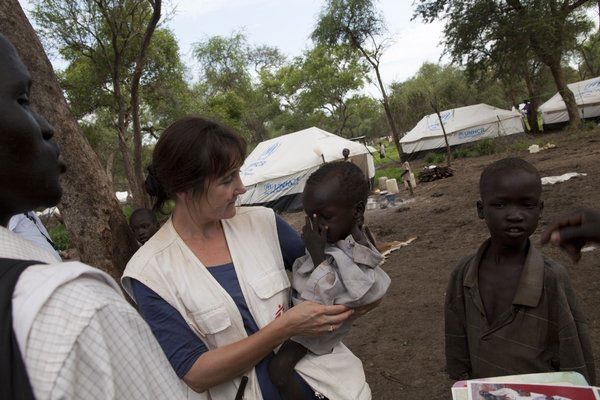The distressing daily experience of the MSF team in Batil refugee camp is echoed in the just-released results of a nutrition and retrospective mortality survey conducted in the camp at the end of July. Tragically, some of the refugees whose family members had died before they reached Batil camp cited “tired of walking” as the cause of death. This suggests an incredibly weak and vulnerable population arriving at the camp, and points to the massive need for assistance to those that managed to arrive alive, but weak.
Mortality more than double emergency levels for children
The newly constructed Batil camp started to accommodate large numbers of refugees in early June, when some 35,000 refugees crossed the border from Sudan’s Blue Nile State. Since the refugees’ arrival in Batil camp, mortality for the total refugee population is substantially above the emergency threshold, and mortality for children under five years old is more than double the emergency threshold.
Between 3 and 4 children under five years old have been dying every day in Batil camp.
58 percent of reported deaths among the refugees since their arrival in Batil camp have been children under five years old. More than 25 percent of reported deaths were for people over 50 years old. In many emergency interventions children under five are the first priority, but to see this level of mortality in over-fifties is unexpected and indicates a particularly dire health situation.
Cause of death
The major cause of death reported while these refugees have been in Batil camp is overwhelmingly diarrhoea, constituting more than 90 percent of deaths, with malnutrition likely to have been a contributory factor in many of the deaths.
Shocking malnutrition
A quarter of children under five years old are malnourished, and 10 percent are in the most severe acute stage of malnutrition, requiring urgent therapeutic feeding.
Even more shocking, half of the children under two years old in the camp are moderately or severely malnourished.
Respiratory diseases rising
The rainy season and cold nights are making matters worse, particularly since many households have only one blanket to share between often six or more people. While respiratory tract infections constituted around 10 percent of MSF’s consultations in Batil in June, they have been rising alarmingly and last week they constituted more than 40 percent of the consultations by MSF medics.
MSF response
MSF has more than 180 expatriate staff and more than 800 locally recruited staff on the ground in the five refugee camps for Sudanese refugees in South Sudan. The first emergency interventions were started in November 2011 when refugees first arrived in Yida and Doro camps in South Sudan. MSF rapidly expanded its emergency activities over the following months as the number of refugees grew, as the rainy season started, and as the health situation in the camps deteriorated.
In its tented field hospital in Batil camp, MSF now has more than 1,600 children suffering from severe acute malnutrition in the therapeutic feeding programme. Every week about 30 of these children need to be admitted into intensive care with life-threatening medical complications such as diarrhoea or respiratory diseases. Since the Batil camp was set up in May, MSF has conducted more than 14,500 medical consultations, as well as assisting with the set-up of water distribution networks and the distribution of basic survival essentials when the refugees first arrived.
Pushing the boundaries of what’s possible:
“This new data reflects exactly what I see every day,” says Helen PATTERSON, MSF’s medical coordinator for Batil camp. “This is a health catastrophe. With half the children under two years old malnourished, and living in cold, wet conditions, and hundreds falling ill with diarrhoea and respiratory diseases, our field hospital is overwhelmed with critically ill patients. We’re pushing the boundaries of what’s possible logistically to get staff and supplies here and continue saving lives.”
Note on time period of the data presented:The mortality data presented here focuses entirely on the period since the refugees arrived in Batil camp. The arrival date for refugees in the camp differed. The households surveyed had arrived in Batil refugee camp between 02.05.2012 and 14.07.2012. To calculate both the recall period before arrival in the camp and while being in the camp to assess mortality accordingly, the recall period was calculated for each individual, individually. The survey was conducted from 25.07.2012 to 30.07.2012.
Mortality more than double emergency levels for children
The newly constructed Batil camp started to accommodate large numbers of refugees in early June, when some 35,000 refugees crossed the border from Sudan’s Blue Nile State. Since the refugees’ arrival in Batil camp, mortality for the total refugee population is substantially above the emergency threshold, and mortality for children under five years old is more than double the emergency threshold.
Between 3 and 4 children under five years old have been dying every day in Batil camp.
58 percent of reported deaths among the refugees since their arrival in Batil camp have been children under five years old. More than 25 percent of reported deaths were for people over 50 years old. In many emergency interventions children under five are the first priority, but to see this level of mortality in over-fifties is unexpected and indicates a particularly dire health situation.
Cause of death
The major cause of death reported while these refugees have been in Batil camp is overwhelmingly diarrhoea, constituting more than 90 percent of deaths, with malnutrition likely to have been a contributory factor in many of the deaths.
Shocking malnutrition
A quarter of children under five years old are malnourished, and 10 percent are in the most severe acute stage of malnutrition, requiring urgent therapeutic feeding.
Even more shocking, half of the children under two years old in the camp are moderately or severely malnourished.
Respiratory diseases rising
The rainy season and cold nights are making matters worse, particularly since many households have only one blanket to share between often six or more people. While respiratory tract infections constituted around 10 percent of MSF’s consultations in Batil in June, they have been rising alarmingly and last week they constituted more than 40 percent of the consultations by MSF medics.
MSF response
MSF has more than 180 expatriate staff and more than 800 locally recruited staff on the ground in the five refugee camps for Sudanese refugees in South Sudan. The first emergency interventions were started in November 2011 when refugees first arrived in Yida and Doro camps in South Sudan. MSF rapidly expanded its emergency activities over the following months as the number of refugees grew, as the rainy season started, and as the health situation in the camps deteriorated.
In its tented field hospital in Batil camp, MSF now has more than 1,600 children suffering from severe acute malnutrition in the therapeutic feeding programme. Every week about 30 of these children need to be admitted into intensive care with life-threatening medical complications such as diarrhoea or respiratory diseases. Since the Batil camp was set up in May, MSF has conducted more than 14,500 medical consultations, as well as assisting with the set-up of water distribution networks and the distribution of basic survival essentials when the refugees first arrived.
Pushing the boundaries of what’s possible:
“This new data reflects exactly what I see every day,” says Helen PATTERSON, MSF’s medical coordinator for Batil camp. “This is a health catastrophe. With half the children under two years old malnourished, and living in cold, wet conditions, and hundreds falling ill with diarrhoea and respiratory diseases, our field hospital is overwhelmed with critically ill patients. We’re pushing the boundaries of what’s possible logistically to get staff and supplies here and continue saving lives.”
Note on time period of the data presented:The mortality data presented here focuses entirely on the period since the refugees arrived in Batil camp. The arrival date for refugees in the camp differed. The households surveyed had arrived in Batil refugee camp between 02.05.2012 and 14.07.2012. To calculate both the recall period before arrival in the camp and while being in the camp to assess mortality accordingly, the recall period was calculated for each individual, individually. The survey was conducted from 25.07.2012 to 30.07.2012.



